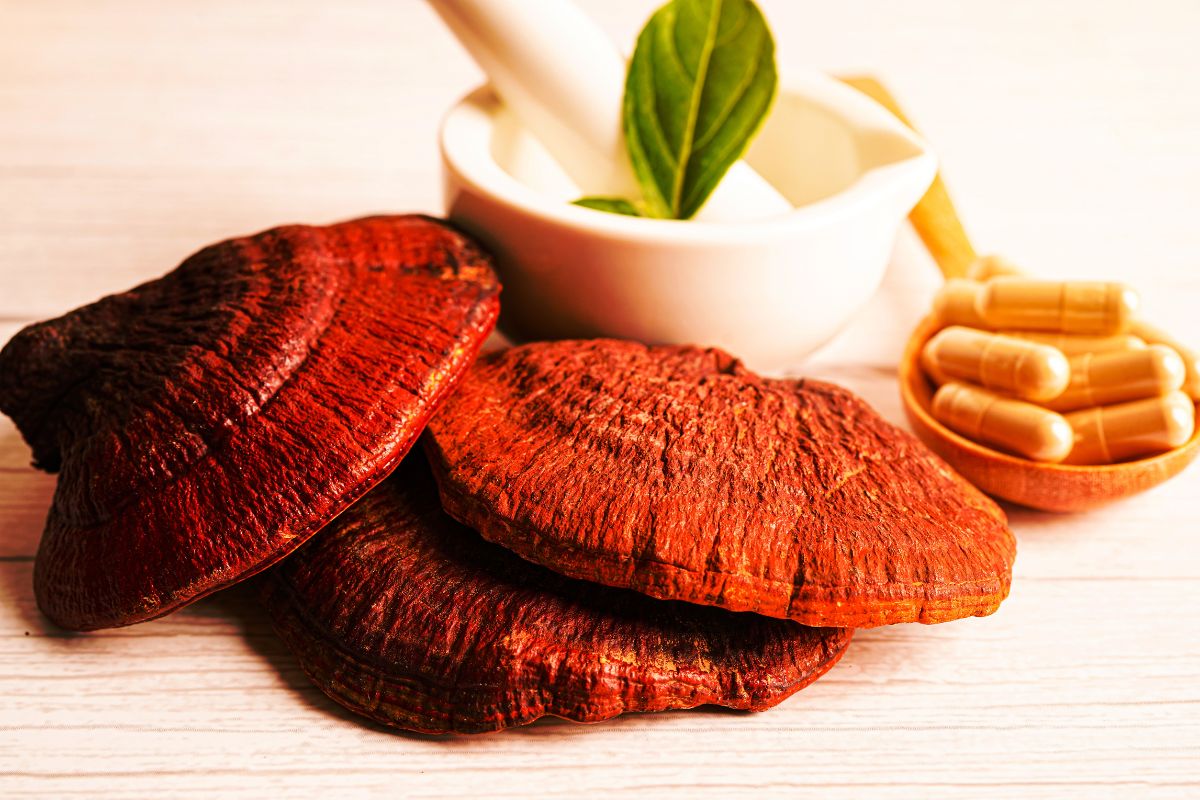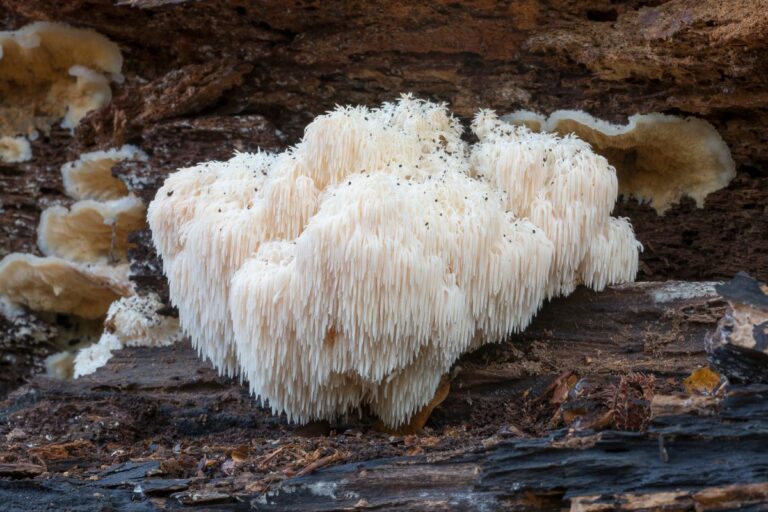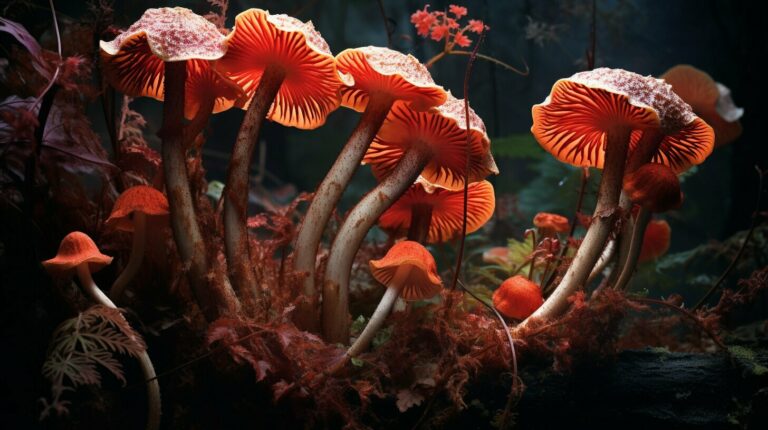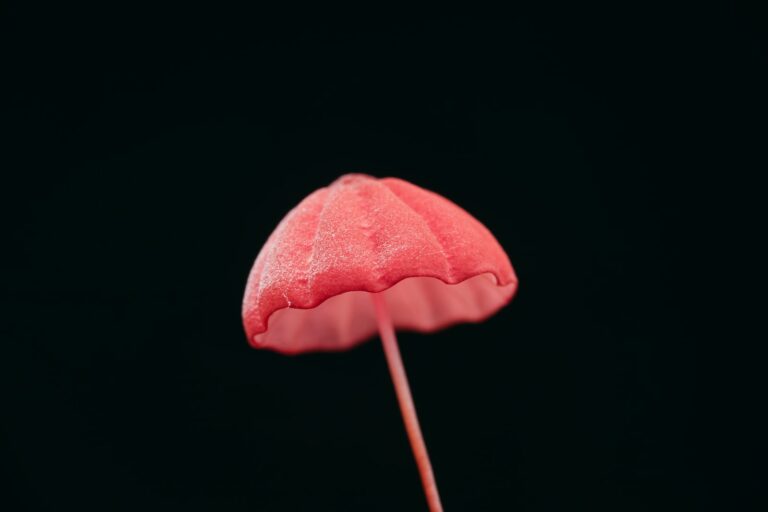Reishi mushroom, also known as Ganoderma lucidum, has been highly regarded for its medicinal properties in traditional Chinese medicine for centuries. It is known for its potential immune-boosting and anti-inflammatory effects, among other benefits. With growing interest in natural remedies, many people are seeking out the best way to incorporate reishi mushroom into their daily routine, taking full advantage of its health properties.
Various methods exist for consuming reishi mushrooms, ranging from teas and extracts to powders and supplements. Each method has its advantages and disadvantages, depending on individual preferences and needs. Some might gravitate toward a more traditional method, such as teas, while others prefer the convenience of supplements in capsule form.
When deciding the best way to take reishi mushroom, it is essential to consider factors such as personal health conditions, taste preferences, and accessibility to high-quality products. Ultimately, the optimal method should provide an effective dose of the beneficial compounds while ensuring an enjoyable and practical experience for the consumer.
Understanding Reishi Mushrooms
Table of Contents
| Attribute | Description |
|---|---|
| Botanical Name | Ganoderma lucidum |
| Common Names | Reishi mushroom, Lingzhi (in China), Mannentake (in Japan), Yeongji (in Korea) |
| Family | Ganodermataceae |
| Type | Fungi, specifically a polypore mushroom |
| Habitat and Distribution | Native to Asia, commonly found on decaying logs and tree stumps; cultivated worldwide |
| Appearance | Typically kidney or fan-shaped with a glossy, reddish-brown to dark-colored cap and white underside |
| Traditional Uses | Revered for over 2,000 years in traditional Chinese medicine for its potential health benefits |
| Active Compounds | Polysaccharides (beta-glucans), triterpenes (ganoderic acids), peptides, and various antioxidants |
| Adaptogenic Properties | Classified as an adaptogen, helping the body adapt to stress and maintain balance in various systems |
| Health Benefits | – Immune system support – Stress reduction and anxiety management – Potential anti-inflammatory and antioxidant effects – Liver health support – Sleep improvement – Potential cancer-fighting properties |
| Preparation | Available as dried slices, powders, capsules, tinctures, and extracts |
| Dosage | Dosage varies by form and individual needs, typically ranging from 1 to 3 grams per day for powdered Reishi or following product instructions for extracts and capsules |
| Safety | Generally considered safe when used as directed. Consult with a healthcare professional if pregnant, nursing, or taking medications. |
| Potential Side Effects | Rare, but can include upset stomach, dry mouth, or allergic reactions in sensitive individuals |
| Interactions | May interact with certain medications, including blood thinners. Consult with a healthcare provider if taking medication. |
| Legal Status | Widely available as a dietary supplement and herbal remedy |
| Research | Ongoing studies explore its potential health benefits, including its role in immune support, cancer treatment, and overall well-being |
Reishi mushrooms, also known as lingzhi or Ganoderma lucidum, are a type of fungus that has been highly valued in Eastern medicine for centuries. Originating in China and Japan, these mushrooms have a history that dates back to the Han Dynasty. Reishi mushrooms are well-known for their potential health benefits and have been used in traditional medicine for various purposes.
The cultivation of reishi mushrooms involves a unique process that requires patience and knowledge. Typically, Ganoderma lucidum grows on hardwood logs or sawdust, and the fruiting bodies can take several months to develop. The harvested mushrooms are then typically dried and ground into a powder or made into an extract, making it easier to consume as supplements, tea, or other forms of intake.
There are several reasons why reishi mushrooms have gained attention in the realm of natural health and wellness. They are believed to offer immune-boosting properties and can potentially help with stress management. Additionally, the mushrooms may have anti-aging properties, which has earned them the nickname “mushroom of immortality.”
While reishi mushrooms hold a significant cultural and historical presence in Eastern medicine, it is essential to take a balanced approach when using them as a supplement. More research is needed to fully understand the specific mechanisms of action and potential benefits that these mushrooms have to offer.
Health Benefits of Reishi Mushrooms
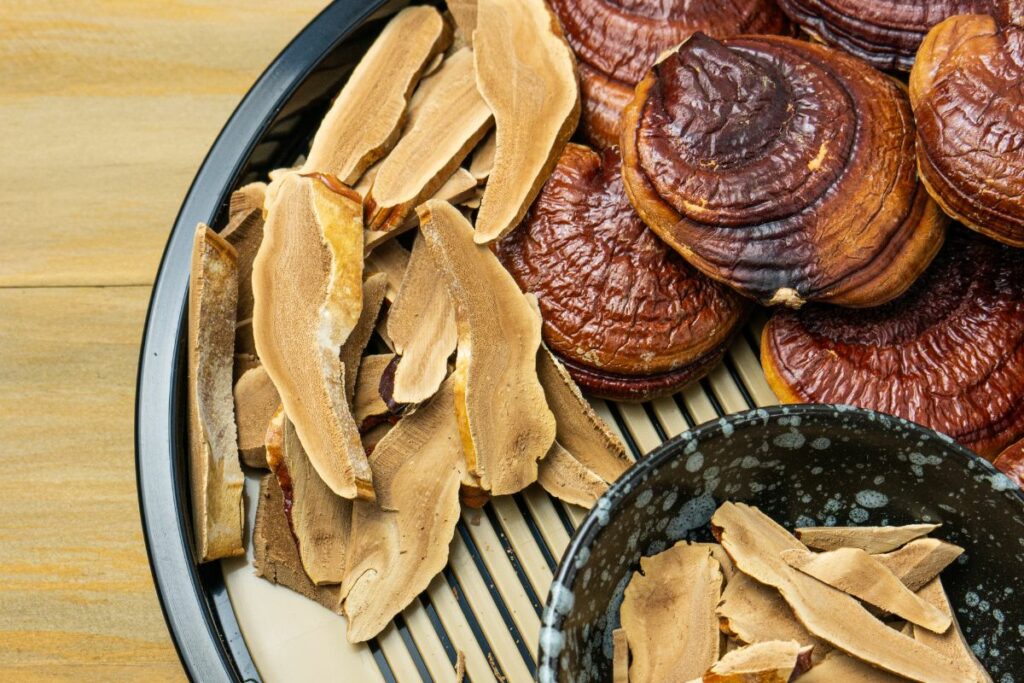
Reishi mushrooms have been used for centuries as a natural remedy for various health issues. They are packed with antioxidants and bioactive compounds that contribute to their numerous health benefits. These medicinal mushrooms are popular for their ability to support the immune system and promote overall well-being.
One of the primary benefits of reishi mushrooms is their positive effect on immune function. They contain beta-glucan compounds that help to modulate and strengthen the immune system. This can be particularly beneficial for those suffering from immune-related conditions or simply looking to maintain optimal health.
In addition to immune support, reishi mushrooms have been known for their anti-inflammatory properties which can help alleviate discomfort in conditions such as arthritis. Furthermore, they have the potential to lower blood pressure, making them a useful natural supplement for those with hypertension.
For individuals dealing with stress and anxiety, reishi mushrooms can be a valuable ally. The therapeutic compounds present in these mushrooms help to promote relaxation and reduce mental fatigue, improving overall well-being. By reducing stress levels, reishi mushrooms may also help to alleviate symptoms of depression in some individuals.
For those who have difficulty sleeping, reishi mushrooms can offer some relief. Owing to their ability to induce relaxation and a sense of calm, they have been found to improve sleep quality in many people. This is particularly useful for those struggling with insomnia or general restlessness at night.
In recent years, the potential role of reishi mushrooms in cancer treatment has gained attention. While further research is still needed, some studies suggest that certain compounds found in reishi mushrooms may help to inhibit the growth of cancer cells and boost the immune system’s natural ability to fight against the disease.
In conclusion, incorporating reishi mushrooms into a daily wellness routine can offer numerous health benefits ranging from immune support, anti-inflammatory effects, and cardiovascular health, to stress reduction and sleep improvement. By harnessing the power of these medicinal mushrooms, one can work towards achieving optimal health and well-being.
Different Forms of Reishi Mushrooms
Reishi mushrooms, scientifically known as Ganoderma lucidum, have been used for their medicinal properties for centuries. These mushrooms are available in various forms to suit different needs and preferences. The most popular forms include dried, powder, extract, capsule, tincture, and tea.
- Dried Reishi Mushrooms are the traditional form of consumption and are often used in soups or brewed as a tea. This method allows for slow extraction of the medicinal compounds, giving users the full benefits of the mushroom.
- Reishi Mushroom Powder is created by grinding the dried mushrooms into a fine powder, making it easier to incorporate into foods, drinks, and even smoothies. The powdered form is more easily absorbed by the body and provides a convenient way to incorporate Reishi into a daily routine.
- Reishi Extracts can be found in both liquid and capsule form, which offer a more concentrated dose of the mushroom’s beneficial compounds. The extracts are created by using solvents, such as alcohol or water, to extract the active ingredients from the mushroom. This results in a more potent and efficient way to consume Reishi mushrooms.
- Capsules often contain Reishi mushroom powder or extract, making them a convenient and portable option for those who want to incorporate this medicinal mushroom into their daily routine without the need for making tea or incorporating it into foods.
- Tinctures are a form of Reishi extract in which the active compounds are dissolved in alcohol. This liquid form allows for easy and flexible dosing, and can be added to drinks and recipes, or taken sublingually for quick absorption.
- Reishi Mushroom Tea is a popular way to enjoy the benefits of this powerful mushroom in a comforting and soothing manner. By steeping the dried mushrooms or using a powder form, one can create a relaxing and health-boosting beverage. However, it’s important to note that the effectiveness of the tea may vary based on preparation methods and the quality of the mushrooms.
Incorporating Reishi mushrooms into one’s diet as a food or dietary supplement can provide numerous health benefits, including boosting the immune system and offering a source of minerals. Determining the best method of consumption depends on individual preferences and needs; however, each form offers unique advantages in delivering the benefits of this powerful medicinal mushroom.
How to Consume Reishi Mushrooms
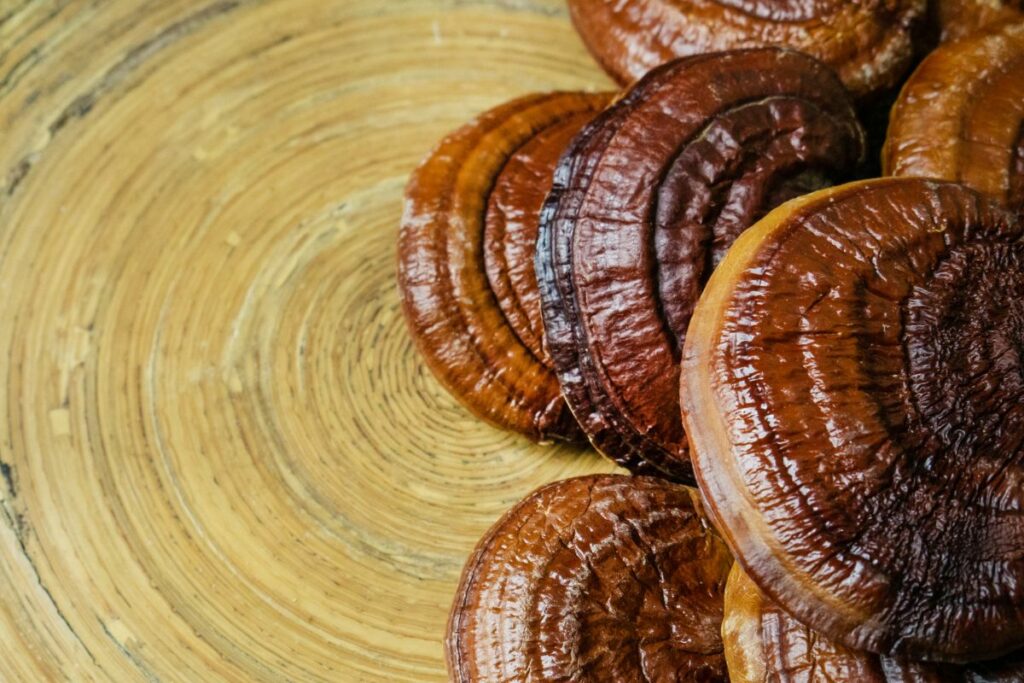
Reishi mushrooms, known for their numerous health benefits, can be incorporated into one’s diet in various ways. As they have a slightly bitter taste, it is common to use certain ingredients like lemon and honey to make consumption more enjoyable.
One popular method to consume Reishi mushrooms is by making a tea. To prepare this, simply simmer the mushroom in water for about 30 minutes. Afterward, strain the liquid and add lemon or honey to taste. Reishi tea can be enjoyed daily, and it allows the body to easily absorb the beneficial compounds found in the mushroom.
Reishi mushrooms can also be added to soups and broths. While cooking, the mushrooms release their nutrients into the liquid, making for a nutritious meal. Adding them to immune-boosting soups with ingredients like garlic, ginger, and turmeric can provide additional health benefits.
For those who prefer a quick and easy option, Reishi mushrooms are available as dietary supplements in the form of powders, capsules, or tablets. When selecting a supplement, it is essential to choose a reputable brand, as the quality and concentration of the mushroom may vary between products.
Another creative way to include Reishi mushrooms in one’s diet is by adding the powdered form to smoothies. Combine Reishi powder with other nutrient-rich ingredients like spinach, berries, and almond milk to create a powerful and tasty health-boosting beverage.
Incorporating Reishi mushrooms into various recipes and forms of consumption is an excellent way to take advantage of their numerous health benefits. From teas and soups to smoothies and supplements, there are plenty of options to fit diverse taste preferences and lifestyles.
Possible Side Effects of Reishi Mushrooms
Reishi mushrooms have been utilized for their medicinal properties for centuries. However, while their health benefits are substantial, it’s essential to be aware of the potential side effects. In most cases, these side effects are mild and manageable, but it’s crucial to know what to look out for when consuming this supplement.
One common side effect of Reishi mushrooms is dizziness, which may occur as a result of the body adjusting to the new substance. Dizziness might be mild and temporary, but if it persists or worsens, it’s essential to consult a healthcare professional. Similarly, some individuals may experience headaches after consuming Reishi mushrooms. As with dizziness, headaches should subside as the body gets accustomed to the supplement. However, if the pain is consistent or intensifies, medical advice should be sought.
Itchiness and rash are other possible side effects associated with Reishi mushroom consumption. These allergic reactions may manifest in various ways, such as skin irritation, swelling, or redness. If these symptoms appear, it’s advisable to stop using the supplement and consult a doctor, as continued use may exacerbate the condition. In rare cases, Reishi mushrooms can also cause more severe allergic reactions, which may include difficulty breathing, chest tightness, or swelling of the face, lips, or tongue. If such symptoms occur, immediate medical attention is necessary.
Some individuals may experience nosebleeds or bleeding after consuming Reishi mushrooms. This side effect is relatively rare, but if it occurs, it’s crucial to consult a healthcare professional to determine the underlying cause. In some instances, the bleed may be a result of an allergic reaction or an interaction with other medications.
Lastly, while Reishi mushrooms are known for their liver-supportive properties, rare cases of liver damage have been reported. This side effect may manifest as fatigue, abdominal pain, or jaundice (yellowing of the skin and eyes). If any of these symptoms are observed, it’s essential to stop using the product and seek medical advice immediately.
In conclusion, Reishi mushrooms can offer numerous health benefits, but users should be aware of the potential side effects. By monitoring for any concerning symptoms and consulting a healthcare professional when necessary, individuals can enjoy the advantages of this powerful supplement safely.
Drug Interactions with Reishi Mushrooms
Reishi mushrooms, known for their potential health benefits, are available in various forms such as capsules, syrups, and teas. However, it is crucial to be aware of possible drug interactions while consuming Reishi mushrooms, especially for people on certain medications.
One of the primary concerns with Reishi mushroom supplements is their potential interaction with anticoagulant and antiplatelet drugs. Reishi supplements have shown to possess anticoagulant properties, which may increase the risk of bleeding when taken alongside medications like warfarin, aspirin, or clopidogrel. Patients scheduled for surgery or taking anticoagulants should exercise caution and consult their healthcare provider before consuming Reishi mushrooms.
Cancer patients undergoing treatment should also be cautious about consuming Reishi mushrooms. Although research on this topic is limited, some studies have suggested that extracts of Reishi mushrooms may interact with medications used for cancer treatment. It is essential to discuss the inclusion of Reishi supplements in your routine with your oncologist to ensure it does not interfere with your cancer therapy.
Furthermore, Reishi mushrooms may interact with medications for diabetes. They can potentially lower blood sugar levels, making it difficult to manage diabetes when taken concurrently with diabetes medications. It is advisable for individuals with diabetes to closely monitor their blood sugar levels and speak with a healthcare professional before including Reishi mushroom supplements in their regimen.
Herbal supplements like ginkgo and fish oil, which are often combined with Reishi mushroom products, may lead to additional interactions. Combining these supplements increases the risk of bleeding, particularly when taken with anticoagulant or antiplatelet drugs. It is vital to consult with a healthcare provider before using any combined supplements to avoid potential risks.
Although Reishi mushrooms are generally considered safe, the FDA does not regulate dietary supplements as strictly as prescription drugs. Therefore, it is essential to purchase Reishi mushroom products from a reliable and reputable source to ensure quality and safety.
In conclusion, when considering incorporating Reishi mushroom supplements into your daily routine, it is crucial to be aware of potential interactions with other medications. Consult with your healthcare provider to minimize risks and ensure safe and effective use of Reishi mushrooms as part of your wellness plan.
Who Should Avoid Reishi Mushrooms
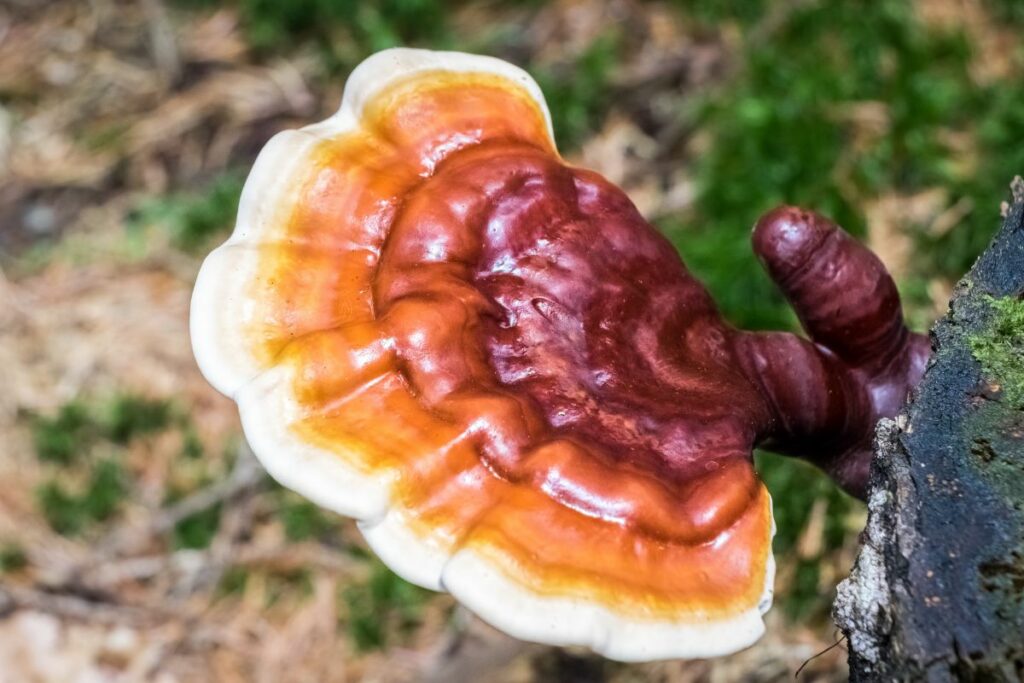
Reishi mushrooms have long been praised for their potential health benefits, but there are certain individuals who should avoid using them. Pregnant and breastfeeding women, for instance, should be cautious with Reishi mushrooms as there is insufficient evidence regarding their safety for this demographic. These individuals would be wise to err on the side of caution and avoid using Reishi mushrooms until more information is gathered.
People undergoing cancer treatment should also speak with their healthcare providers before including Reishi mushrooms in their regimen. While some studies mention the potential cancer-fighting properties of the mushrooms, it’s important to note that these findings are not yet conclusive. Additionally, Reishi mushrooms may interact with cancer medications, potentially reducing their effectiveness or causing adverse reactions.
Finally, individuals with autoimmune disorders or those scheduled for surgery should exercise caution with Reishi mushrooms. The immunomodulatory properties of these fungi may interfere with the body’s natural immune response, potentially causing complications during surgery or exacerbating pre-existing conditions.
In summary, pregnant and breastfeeding women, those undergoing cancer treatment, and individuals with autoimmune disorders or upcoming surgeries should consult their healthcare providers before incorporating Reishi mushrooms into their health routines. It’s essential to prioritize safety and consult with professionals when making any significant changes to one’s diet or supplementation program.
Quality and Safety with Reishi Mushroom Products
Reishi mushroom, also known as Ganoderma lucidum, is a well-known medicinal mushroom with numerous health benefits. When it comes to selecting and consuming reishi mushroom products, it is essential to prioritize quality and safety.
High-quality reishi mushroom products often come from organic sources, ensuring that no harmful chemicals or pesticides are present. Organic certification guarantees that the mushrooms are cultivated under strict guidelines, preserving the integrity of their beneficial compounds. It is crucial to research and choose reliable brands that adhere to such organic practices.
Quality control is another significant aspect to consider. Reishi mushroom products of over 90 brands have been identified, making it challenging for consumers to determine which products meet the highest standards. When choosing a product, consider the methods of cultivation and processing, as well as the presence of third-party testing to verify the product’s purity and effectiveness.
Reishi mushrooms are highly perishable, with a shelf life of about 24 hours in their fresh state. Proper storage and handling play a significant role in maintaining the safety and quality of the product. Select products that are properly packaged and stored to extend shelf life and ensure maximum freshness.
Safety is paramount when consuming reishi mushroom products. It is important to be aware of potential allergens and side effects related to reishi mushrooms. Consult with a healthcare professional before starting any new supplements, especially if you are pregnant, nursing, have a medical condition, or are taking medication.
In summary, when considering reishi mushroom products, prioritize organic sources, choose reputable brands, and ensure proper storage and handling for optimal quality and safety. Always consult with a healthcare professional for personalized advice in using reishi mushroom products for health and wellness.
Frequently Asked Questions
How to prepare reishi mushroom for consumption?
Reishi mushroom can be prepared for consumption in multiple ways. One of the most common methods is to make a tea or a soup with dried or fresh mushrooms. To do this, simmer the mushrooms in water for an extended period, usually between 1-2 hours. Once the liquid is absorbed and reduced, strain it to remove any mushroom residue before drinking or using it in your recipes.
What are the benefits of reishi mushroom?
Reishi mushrooms are known for their health-supporting properties, which include boosting the immune system, supporting liver function, and promoting overall wellness. Some studies also suggest potential cancer-fighting properties due to their antioxidant and anti-inflammatory effects. You can read more about the benefits of reishi in this article.
How long does it take to experience reishi mushroom effects?
The time it takes to experience the effects of reishi mushroom can vary based on individual factors and the specific health concerns in question. Generally, it might take a few weeks to several months of consistent consumption before noticing significant improvements in health or wellbeing.
What is the recommended time to take reishi supplements?
Reishi supplements can be taken at any time of the day, depending on personal preference and convenience. However, some people prefer to take them in the evening or before bed due to the calming and relaxation effects they may provide. It is important to follow the manufacturer’s guidelines on dosage and frequency.
Should reishi be consumed with or without food?
Whether to consume reishi supplements with or without food is a personal preference. There are no specific guidelines regarding food intake and reishi consumption. However, it may be easier for some individuals to tolerate reishi supplements when taken with a meal.
Are there any side effects of using reishi mushroom?
Reishi mushroom is generally considered safe for most people. However, some individuals may experience minor side effects such as digestive discomfort, dizziness, or skin rashes. It is important to discuss your health history with a healthcare professional before using reishi, especially if you have a pre-existing condition or are taking medications.

